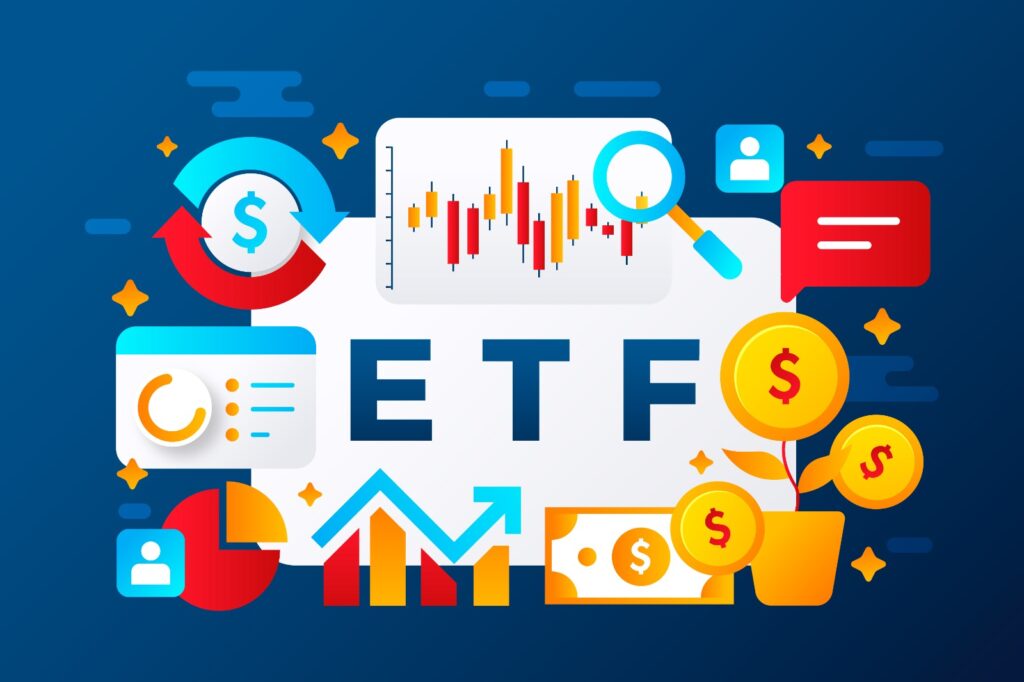ETFS
An Exchange-Traded Fund (ETF) is an investment fund that holds a diversified portfolio of underlying assets such as stocks, bonds, commodities, or other securities and is traded on stock exchanges like regular stocks. ETFs allow investors to buy and sell shares throughout the trading day at market prices, providing flexibility that is different from mutual funds, which only trade once a day after market close.

Overview and How ETFs Work
Exchange-Traded Funds (ETF)s pool money from many investors to invest in a basket of securities, providing instant diversification and exposure to various asset classes. Each share represents partial ownership in the fund’s overall portfolio. ETFs can be passively managed to track an index, such as the S&P 500, or actively managed, where portfolio managers select securities to buy and sell. Unlike mutual funds, ETFs trade on exchanges with fluctuating prices throughout the day, similar to stocks. This feature enables investors to use strategies like margin trading and short selling with ETFs.
Types of ETFs
- Passive ETFs: Track a specific index or benchmark, providing broad market exposure.
- Actively Managed ETFs: Managers actively pick securities; these typically have higher fees.
- Equity ETFs: Invest in stocks across sectors or markets.
- Bond ETFs: Include government, corporate, or municipal bonds for income.
- Commodity ETFs: Invest in physical commodities like gold or oil.
- Sector or Industry ETFs: Focus on specific sectors like technology, energy, or financials.
- Currency ETFs: Track currency performance for hedging or speculation.
Features of ETFs
- Trade Like Stocks: Exchange-Traded Funds (ETF)s are traded on stock exchanges throughout the trading day with real-time pricing, unlike mutual funds that trade only once per day after market close.
- Diversification: Each Exchange-Traded Funds (ETF )holds a basket of securities, offering investors exposure to multiple assets in a single investment, which reduces risk compared to individual stocks.
Read More
- Transparency: Exchange-Traded Funds (ETF)s disclose their holdings daily, allowing investors to know exactly what assets they own.
- Low Cost: Exchange-Traded Funds (ETF)s generally have lower expense ratios than mutual funds due to passive management and efficient operational structure.
- Liquidity: Exchange-Traded Funds (ETF0s offer high liquidity as they can be bought and sold anytime during market hours, and many have high trading volumes.
- Flexibility: Investors can use advanced trading strategies such as limit orders, stop-loss orders, short selling, and margin trading with ETFs.
- Variety: Wide range of Exchange-Traded Funds (ETF)s available across different asset classes, sectors, geographies, and investment themes to suit diverse investor preferences.
Pros
- Diversification: ETFs provide instant diversification by holding a broad portfolio of securities, reducing individual asset risk.
- Lower Costs: Typically have lower expense ratios than mutual funds due to passive management and lower operational costs.
- Liquidity and Flexibility: Can be traded throughout the day on exchanges, allowing investors to buy or sell at market prices anytime during trading hours.
- Transparency: Daily disclosure of holdings provides investors clear insight into what they own.
- Access to Various Markets and Assets: Investors can access a wide range of asset classes, sectors, and geographies easily.
- Ability to Use Advanced Trading Strategies: Investors can use limit orders, stop-loss orders, short selling, and margin trading with ETFs.
Cons
- Trading Costs: While ETFs generally have low expense ratios, frequent trading may incur brokerage commissions and bid-ask spread costs.
- Market Risk: ETFs are subject to market fluctuations, and investors can lose principal just like with stocks or mutual funds.
- Tracking Error: Some ETFs may not perfectly track their underlying index, causing discrepancies in performance.
- Liquidity Concerns for Niche ETFs: Less popular or specialized ETFs may have low trading volumes, resulting in wider spreads and less liquidity.
- Complexity for Beginners: Understanding how ETFs work, including creation/redemption mechanics and tax implications, can be complex.
- Potential Overtrading: The ease of trading ETFs intraday may encourage excessive trading, which can reduce investment returns due to costs and taxes.

